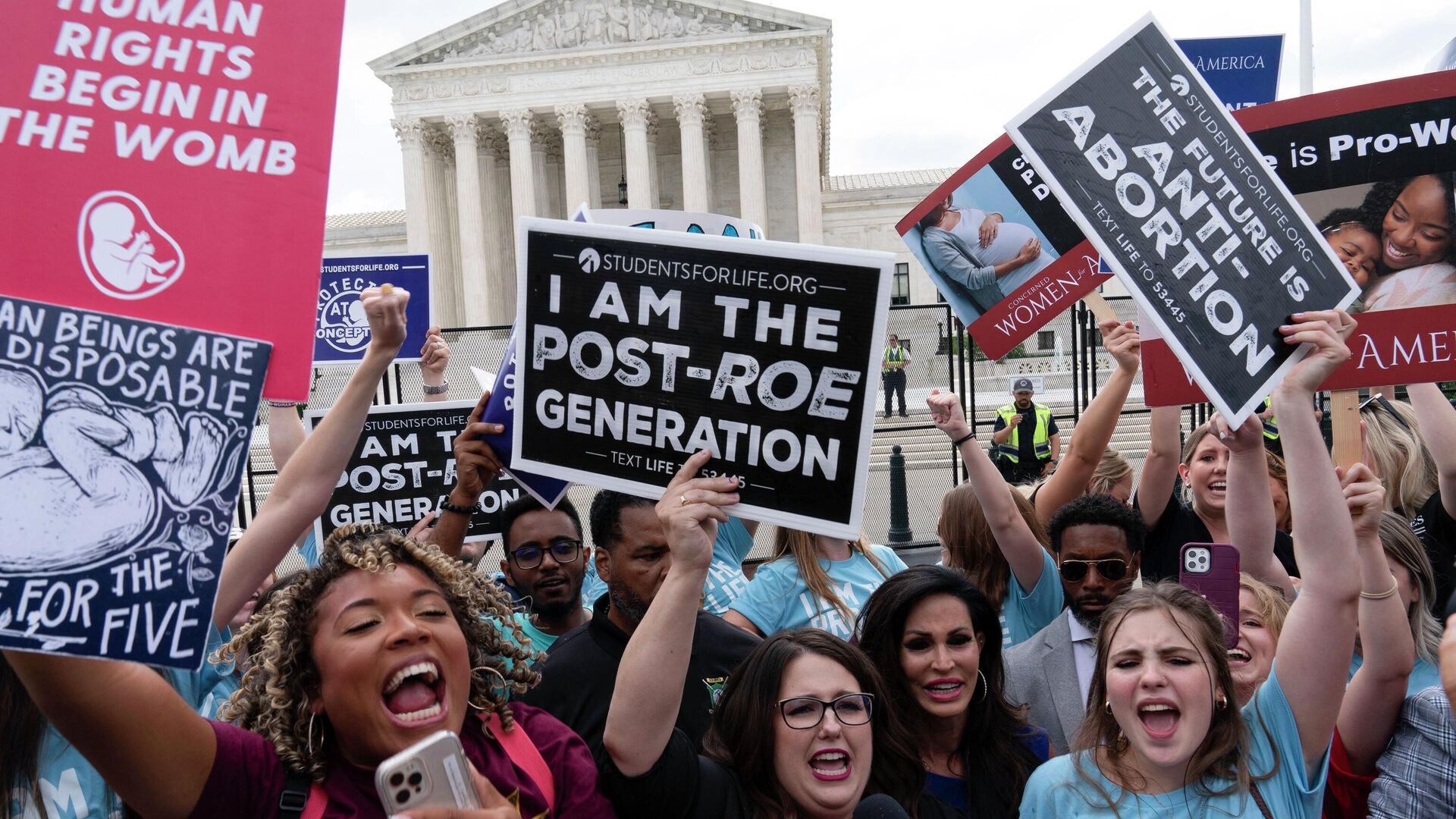https://sputnikglobe.com/20220624/us-supreme-court-overturns-landmark-roe-vs-wade-allowing-states-to-ban-abortions-1096635639.html
US Supreme Court Overturns Landmark Roe v. Wade Allowing States to Ban Abortions
US Supreme Court Overturns Landmark Roe v. Wade Allowing States to Ban Abortions
Sputnik International
A draft opinion from Supreme Court justices that suggested that the landmark ruling, which effectively prevented states from banning abortions, would be... 24.06.2022, Sputnik International
2022-06-24T14:15+0000
2022-06-24T14:15+0000
2022-06-24T16:36+0000
us
roe v. wade
abortion
https://cdn1.img.sputnikglobe.com/img/07e6/06/18/1096636126_0:0:3072:1728_1920x0_80_0_0_eaa7d67c46f88856fcb471ff50ce49ed.jpg
The US Supreme Court has overturned the landmark Roe v. Wade ruling of 1973 which had been protecting US women's right to abortion for nearly five decades.Justice Alito wrote in his opinion that the US Constitution "does not confer a right to abortion" and that it contains no mention that states should be stripped of their ability to regulate or prohibit abortion. He further argued that with Roe v. Wade overturned, the authority to regulate abortion is "returned to the people and their elected representatives".The five justices appointed by Republican presidents - Clarence Thomas, Samuel Alito, Neil Gorsuch, Brett Kavanaugh and Amy Coney Barrett - all voted in favor of abolishing Roe v. Wade. Meanwhile, the three justices appointed by Democrats Bill Clinton and Barack Obama - Stephen Breyer, Sonia Sotomayor and Elena Kagan - voted against the move, expressing their regret later in the dissenting opinion:For his part, Chief Justice John Roberts abstained, writing in a separate opinion that he would not overturn Roe v. Wade entirely but rather uphold Mississippi's law – a 2018 law passed by Mississippi Legislature and struck down by the now-overturned 1973 landmark Supreme Court ruling. The Mississippi law banned most abortions after 15 weeks instead of the 24 weeks established in Roe v. Wade.What's Next?With Roe v. Wade out of the picture, every US state may now pass its own abortion legislation unless Congress passes a federal law prohibiting so. According to some estimates, as many as half of the US states may pass laws greatly limiting abortion rights or banning abortions entirely.Passing a federal law regulating abortions and stripping states of that right also seems improbable in the near future, given that Democrats' current control over both chambers is slim. The Democrats largely stand in favor of abortion rights. With the Senate split 50/50 and Republicans supporting conservative views on limiting abortions, it will be difficult for Democrats to overcome a filibuster for such a bill.The party also seems to have dim prospects of changing the balance of power in the upcoming midterms. Not only does the Democratic president suffer from low levels of public support, but the administration in general faces criticism for its inability to resolve acute issues before it – namely four decades-high inflation, specifically on food and gasoline. In addition to that, the Democrats failed to pass some of Biden's key legislation pieces, sometimes due to their inability to reconcile within their own ranks, further reducing the party's chances of maintaining or boosting control over Congress.Talk of passing a federal law started to circulate within the Democratic Party ranks soon after an unknown person leaked a draft opinion by Justice Samuel Alito in February this year. The leaked draft mostly repeated the opinion issued by the justice today. Its early publication in the media prompted a storm of criticism and protests in DC and outside the homes of conservative justices, but nonetheless did not impact voting.
https://sputnikglobe.com/20220609/biden-warns-of-mini-revolution-in-midterms-if-us-supreme-court-revokes-roe-v-wade-1096148565.html
Sputnik International
feedback@sputniknews.com
+74956456601
MIA „Rossiya Segodnya“
2022
Tim Korso
https://cdn1.img.sputnikglobe.com/img/07e6/03/0d/1093831826_0:0:216:216_100x100_80_0_0_e3f43a960af0c6c99f7eb8ccbf5f812c.jpg
Tim Korso
https://cdn1.img.sputnikglobe.com/img/07e6/03/0d/1093831826_0:0:216:216_100x100_80_0_0_e3f43a960af0c6c99f7eb8ccbf5f812c.jpg
News
en_EN
Sputnik International
feedback@sputniknews.com
+74956456601
MIA „Rossiya Segodnya“
Sputnik International
feedback@sputniknews.com
+74956456601
MIA „Rossiya Segodnya“
Tim Korso
https://cdn1.img.sputnikglobe.com/img/07e6/03/0d/1093831826_0:0:216:216_100x100_80_0_0_e3f43a960af0c6c99f7eb8ccbf5f812c.jpg
us, roe v. wade, abortion
us, roe v. wade, abortion
US Supreme Court Overturns Landmark Roe v. Wade Allowing States to Ban Abortions
14:15 GMT 24.06.2022 (Updated: 16:36 GMT 24.06.2022) A draft opinion from Supreme Court justices that suggested that the landmark ruling, which effectively prevented states from banning abortions, would be overturned was leaked earlier this year. It prompted a wave of protests in the US against the conservative-dominated court.
The US Supreme Court has
overturned the landmark Roe v. Wade ruling of 1973 which had been protecting US women's right to abortion for nearly five decades.
"Roe was egregiously wrong from the start. Its reasoning was exceptionally weak, and the decision has had damaging consequences. And far from bringing about a national settlement of the abortion issue, Roe and Casey have enflamed debate and deepened division," Justice Samuel Alito said in expressing the opinion supported by the majority of the nine-justice court.
Justice Alito wrote in his opinion that the US Constitution "does not confer a right to abortion" and that it contains no mention that states should be stripped of their ability to regulate or prohibit abortion. He further argued that with
Roe v. Wade overturned, the authority to regulate abortion is "returned to the people and their elected representatives".
The five justices appointed by Republican presidents - Clarence Thomas, Samuel Alito, Neil Gorsuch, Brett Kavanaugh and Amy Coney Barrett - all voted in favor of abolishing Roe v. Wade. Meanwhile, the three justices appointed by Democrats Bill Clinton and Barack Obama - Stephen Breyer, Sonia Sotomayor and Elena Kagan - voted against the move, expressing their regret later in the dissenting opinion:
"With sorrow - for this Court, but more, for the many millions of American women who have today lost a fundamental constitutional protection - we dissent".
For his part, Chief Justice John Roberts abstained, writing in a separate opinion that he would not overturn Roe v. Wade entirely but rather uphold Mississippi's law – a 2018 law passed by Mississippi Legislature and struck down by the now-overturned 1973 landmark Supreme Court ruling. The Mississippi law banned most abortions after 15 weeks instead of the 24 weeks established in Roe v. Wade.
With Roe v. Wade out of the picture, every US state may now pass its own abortion legislation unless Congress passes a federal law prohibiting so. According to some estimates, as many as half of the US states may pass laws greatly limiting abortion rights or banning abortions entirely.
Passing a federal law regulating abortions and stripping states of that right also seems improbable in the near future, given that Democrats' current control over both chambers is slim. The Democrats largely stand in favor of abortion rights. With the
Senate split 50/50 and Republicans supporting conservative views on limiting abortions, it will be difficult for Democrats to overcome a filibuster for such a bill.
The party also seems to have dim prospects of changing the balance of power in the upcoming midterms. Not only does the Democratic president suffer from low levels of public support, but the administration in general faces criticism for its inability to resolve acute issues before it – namely four decades-high inflation, specifically on food and gasoline. In addition to that, the Democrats failed to pass some of Biden's key legislation pieces, sometimes due to their inability to reconcile within their own ranks, further reducing the party's chances of maintaining or boosting control over Congress.
Talk of passing a federal law started to circulate within the Democratic Party ranks soon after an unknown person leaked a draft opinion by Justice Samuel Alito in February this year. The leaked draft mostly repeated the opinion issued by the justice today. Its early publication in the media prompted a storm of criticism and protests in DC and
outside the homes of conservative justices, but nonetheless did not impact voting.



